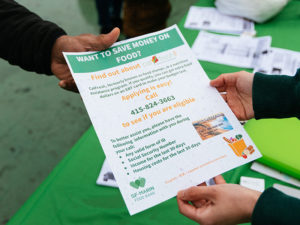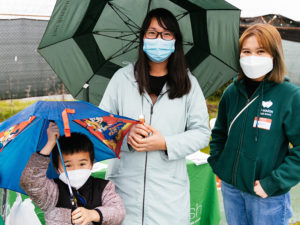“I just went to the store, and a carton of eggs was over $10. And now I’m only going to receive $23? What can I buy with that?”
This is the predicament that Gladys, and nearly 82,000 other households in San Francisco and Marin are facing this month due to the end of CalFresh (aka SNAP, or food stamps) emergency allotments. During the pandemic, CalFresh recipients received a boost to their monthly budget for groceries. For Gladys, these emergency allotments were a buoy to hang onto as inflation remained high – but they came to an end nationwide in February.
Staring Down a Benefits Cliff
 “I pick up groceries from the food pantry in the Canal (San Rafael) on Tuesdays, and the rest I buy with my food stamps. Last month, I received $211. Now, the letter from the county says I’ll receive $23, at most $29,” Gladys told us over the phone in Spanish. As a senior, grocery shopping is already made difficult by mobility issues: “My son will often go shopping for the both of us. I’m scared I’m going to fall.” Now, it will be doubly difficult without the emergency allotments she depended on previously.
“I pick up groceries from the food pantry in the Canal (San Rafael) on Tuesdays, and the rest I buy with my food stamps. Last month, I received $211. Now, the letter from the county says I’ll receive $23, at most $29,” Gladys told us over the phone in Spanish. As a senior, grocery shopping is already made difficult by mobility issues: “My son will often go shopping for the both of us. I’m scared I’m going to fall.” Now, it will be doubly difficult without the emergency allotments she depended on previously.
Gladys works as a caretaker for a woman in her neighborhood, and lives and splits rent with her adult son. It’s hard to make heads or tails of the prices she sees at the grocery store: “When I do go shopping, I see that everything is so expensive: beef, chicken, eggs. And if I want bread or something else?” Her voice trails off, as if to say, “Forget about it.”
Food Banks Already at the Brink
In San Francisco and Marin, the benefits cliff will be especially steep: emergency allotments for our counties averaged out at $150 and $160, respectively. Currently, the California Department of Social Services is directing affected CalFresh recipients to supplement their budget by heading to their local food banks – even though many CalFresh recipients like Gladys were already frequenting food banks to make ends meet. But the San Francisco-Marin Food Bank, and others in the area, are stretched to the limit by inflation, shrinking government support, and declining donations.
“It’s An Injustice”
Food banks are a band-aid, not a long-term solution for the erosion of safety nets. So while our Policy and Advocacy team continues to push at the federal level for benefits that better reflect the cost of living in our counties, and our CalFresh team continues assisting households in applying and securing the benefits they qualify for, we need our community members and local elected officials to rally in support of our neighbors facing food insecurity.
and Advocacy team continues to push at the federal level for benefits that better reflect the cost of living in our counties, and our CalFresh team continues assisting households in applying and securing the benefits they qualify for, we need our community members and local elected officials to rally in support of our neighbors facing food insecurity.
It will take all our collective efforts to mitigate the harm stemming from the end of these emergency allotments – because for Gladys and thousands of others, this decision is nothing short of devastating.
“I just don’t agree with this. No one agrees with this,” Gladys shared. “We won’t have food. It’s an injustice.”
Take Action
As safety nets erode, the Food Bank needs your support to help nourish our neighbors.
Donate now


Share